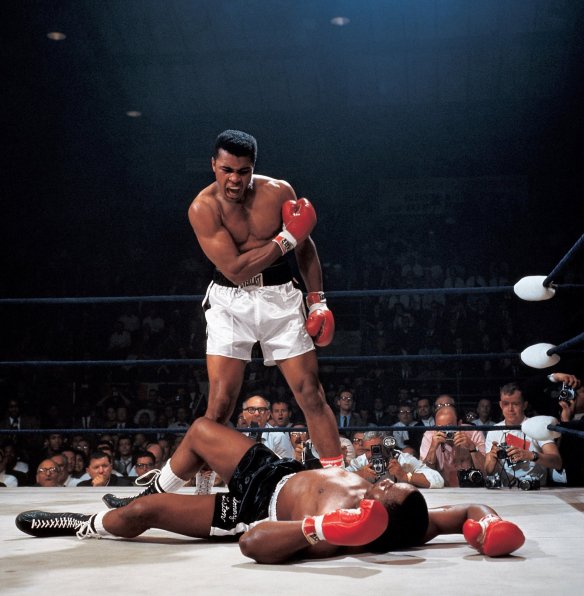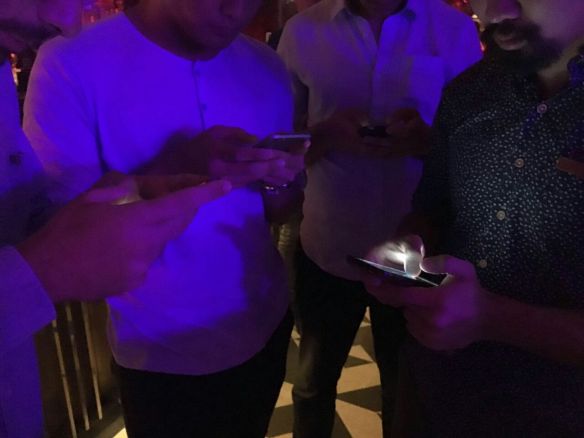
(Taken from Unsplashed.com)
Yep, no shit.
I wasn’t paid though. I did it as a favour.
As to how I got the ‘job’, there’s a bit of a story behind it.
How I Got Tapped To Be Editor
When I young, I became something of a budding writer. This reputation mostly stemmed from the fact that I wrote lots of horrible poems (gotta give the teenage angst an outlet). But my classmates were duly impressed by my ‘talent’. Even my teachers were kind of impressed with my poems (although they must have had winced at my rather amateurish attempts) and subtly nudged me to develop my ‘poetry inclinations’.
I was 13 when I hit the peak of my writing productivity. I churned out horrible poems, made pitiful attempts at short stories, and even co-wrote a book with a friend. When I say “co-wrote”, what I really mean is that my friend came up with the idea and wrote the lion share of the novel. I jumped into the project late. So I mostly helped to proofread, made sure that the plot was coherent and contributed a chapter or two. But my most significant role was to… you’ve guessed it… write a poem or two for the book.
I don’t know why a very Tom Clancy-esque Cold War triller required poems but it was a creative decision we made. So we’ll have to live with that.
The book focused on a series of military subterfuges between the U.S. and Russia. And like all 13-year-old budding writers who wanted to make the book more exciting and cool, we added a twist at the end (spoiler alert: China got involved. And possibly North Korea).
Yep, we actually finished the book. We planned to write the sequel but didn’t go through with it as the 9/11 attacks had occurred. But that’s besides the point.
So my friend printed, bound, and laminated a bunch of copies before distributing them among our classmates. While he put my name down as co-writer on the cover, I have to say that he was the one who saw through this project. I was losing steam at the end. That’s why he’s now a neurosurgeon and I’m not.
The reception for the book was mostly polite enthusiasm. I don’t think our classmates were captivated by the story (it had a rather predictable plot and was full of stock characters), but they were definitely impressed that we wrote a book. So in their eyes, we were legit writers.
LEGIT.
And given my prior status as a ‘poet’, I was doubly legit.
DOUBLY LEGIT, I tell you.
And it was this very reputation that convinced a classmate to ‘hire’ me.
As an editor.
A legit one? I don’t know. But we’ll leave that judgement aside for now.
This classmate (whom we shall call ‘N’) approached me one morning during the homeroom period. He was working on a book and needed my reputable ‘skills’. Awesome, I said, another co-writer status.
But N shook his head. He didn’t want me to be the co-writer. He had finished the book (the first draft to be exact). What he wanted was my ‘skills’ to make it as awesome as possible.
Oh, so an editor then.
N was confused and asked what an editor was.
I told him it was someone who edits or make changes to a book.
Horror crept upon N’s face as he unconsciously inched away from me. No, no, no, he didn’t want any changes, he just wanted the book to be as awesome as possible.
Now it was my turn to be confused. I told N that it wasn’t possible to make the book awesome without some changes.
But he was adamant. No changes.
I told him that the book would need some changes if he wanted it to be awesome.
No, he said.
Yes, I said.
We traded ‘yes’ and ‘no’ until I finally offered a ‘compromise’. I would write my comments in the margins and suggest what changes he had to make. It was up to him to accept my suggestions. He had the final say.
Satisfied with the ‘compromise’, N said he would pass me the manuscript the next day.
Damn writers, I thought, as the classmate left my homeroom.
Then I remembered I was a writer too. Well, sort of.
And that was how I became an “editor”.
Editors all is Grammar Nazis… But Me Not
The next day, N handed me the manuscript. I thumbed through it and estimated that it was about the same length as the book I co-wrote with Mr. Future Brain Surgeon.
And we’re talking about 70 A4-size pages of single-spaced, 12pt, Times New Roman font. So each page would have about 400 – 600 words, bringing the total to about 28,000 – 42,000 words.
It wasn’t a lot, honestly, but it was still going to be a slog.
I told the classmate to give me a week.
(Current me: That was a fucking optimistic estimate. It probably took me two weeks).
He nodded. He was fine with that.
I added a parting remark. My command of grammar was not the best. So if I missed out any glaring grammatical errors, it wasn’t intentional. But I promised I would do my best to spot both his and my grammatical mistakes.
N gave me a puzzled look. But you’re a writer, he said.
Well… kind of… but that doesn’t mean my grammar is perfect.
N looked more confused. He said that I wrote a book.
Co-wrote a book, I corrected him.
Still, he pressed on, you’re a good writer so shouldn’t your grammar be perfect?
I finally managed to convince N that I had some semblance of grammar knowledge to be an editor and he left my homeroom with some trust (and hope) that his manuscript was in good hands.
I might have also pulled the “co-writer” and “poet” cards on him.
That Goddamn Sentence
A quick gist of the story.
It was about a 15-year-old protagonist from the hood who was hell-bent on acquiring cash, power and status and become the most powerful underworld figure. A very run-of-the-mill “get rich or die trying” plot.
It’s actually a fucking awesome story. Awesome but completely un-fucking-believable.
Somehow, our 15-year-old protagonist rose through the ranks to control the drugs and weapons trade along the U.S. East Coast and had numerous gangs, triads and mafias swear fealty to him.
And he accomplished that within 2 years.
That’s some hardcore dude.
At that time I did not know much about the gang culture in the States, and whatever knowledge I had about mafias and gangs came from watching American and Hong Kong gangster films. But I knew enough to go “whaaaattttt… how’s that possible?” when I read the story.
It was also at this moment when I came across the sentence that would cause me and N to argue for two days.
180 vs. 360
All rags-to-riches stories require a little psychological insight into the psyche of the protagonist.
It was very simple insight. Basically the protagonist was tired of being the underdog and wanted to be the top dog. Instead of being a low-level gangbanger, he realized he had to make the change soon, otherwise he was going to wind up dead or in jail.
This was when that sentence made its appearance:
So I decided to turn around my life 360 degrees and start on a new path.
Except, something was not right.
I thought for a minute. Yeah, something’s definitely not right.
I stared at the sentence for a couple more minutes, that annoying thought niggling at my brain before I finally got why the sentence wasn’t right.
And it wasn’t just the grammar.
If you still haven’t got it, I’ll illustrate below.
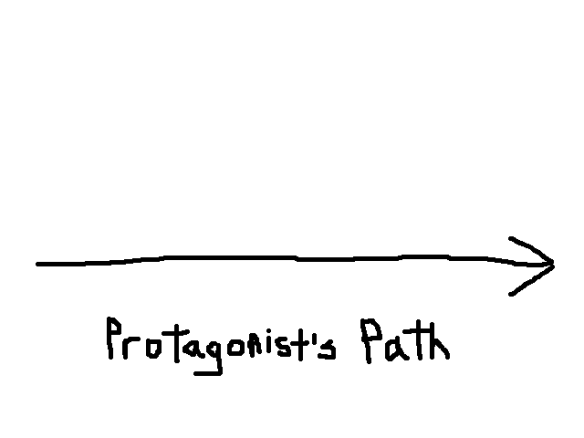
So this is the life path of the protagonist. He’s on the highway to Hell. And he wants to escape it.
Does he make a 180 degrees turn or a 360 degrees turn? Let’s go with 180 degrees first.
180 degrees:
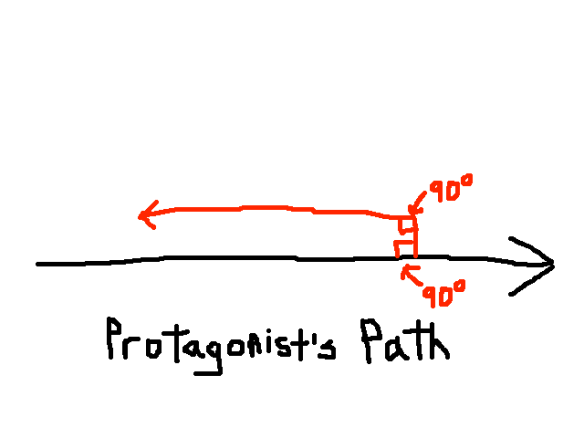
So the red line represents the protagonist’s new path. He’s now heading away from the shitty life and onto greater riches. And see the two 90 degrees turns he has to make?
90 + 90 = 180 degrees.
Maths, motherfucker. Do you speak it?
So what happens if the protagonist makes a 360 degrees turn? Let’s find out.
360 degrees:
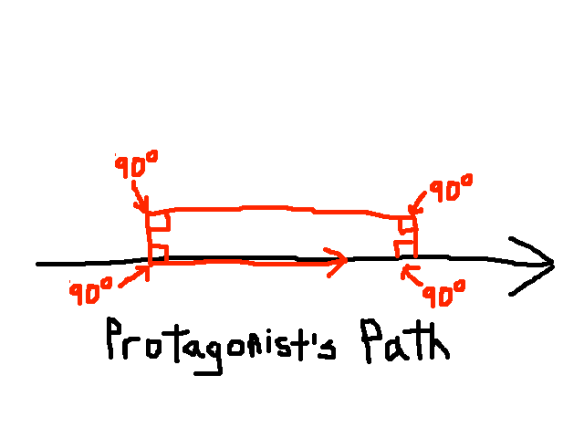
90 + 90 + 90 + 90 = 360 degrees.
The protagonist is back on the highway to Hell. He literally made a full circle.
And that was what I explained to N. I even did the drawings, but differently at that time.
The sentence simply did not make any sense.
No, N said, it made sense. The protagonist is turning his life around.
Yes, I countered, but turning his life around doesn’t mean turning in a full circle. The sentence was supposed to be an analogy.
No, N argued, it doesn’t make sense to only turn half a circle. If you were driving and you had to make a U-Turn, you would go back to where you came from. So the protagonist had to make a full 360 degrees to turn his life around.
Yes, but, I mean, but, hang on…
I pointed out to N that the explanation didn’t make sense and worst of all, it didn’t apply to the road of life, which in all honesty, a very fucked up road branching off int0 numerous directions only to end at the same destination.
We had a standoff for two days over that sentence. I was bloody adamant on amending it. N was bloody adamant on not amending it.
In the end, I managed to end the standoff.
By pulling the “co-writer” and “poet” cards on N again.
How I Got Fired
I actually don’t remember the details. But the 180 vs. 360 argument sowed the seeds of discord and in the end we parted over creative differences. Whatever it was, I edited the manuscript to the best of my ability before my departure. Fortunately, there was no lasting animosity between us two. And to N’s credit, he did finish an entire manuscript all by himself at the age of 14 and I respected him for that.
After that project I swore I would never work for a client.
Then I became a copywriter.




